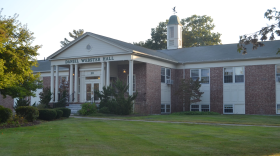The city of Nashua says it's ramping up coronavirus testing and outreach.
NHPR's Morning Edition Host Rick Ganley spoke with Nashua's Public Health Director Bobbie Bagley about the city's response to the pandemic.
(Editor's note: this transcript has been edited lightly for clarity.)
Rick Ganley: I know that expanding testing has been talked about for a while now as a key in limiting the spread of the coronavirus. Many states and cities have said that limited supplies have made it difficult to ramp up testing. What's Nashua strategy?
Bobbie Bagley: Well, we've actually had the opportunity to receive additional supplies from our state. There has been an order of supplies that have come in to New Hampshire that allows us to ramp up the testing that we need to do in our community. And so, I've been able to secure those additional supplies through the state. Because we are a health department and a regional public health network lead, we also have some [personal protective equipment] that's here that we can use while we're doing these community events.
Rick Ganley: What does that look like specifically? What is going to be happening the next couple of weeks?
Bobbie Bagley: When things first started there were very key people that were recommended for testing. That was our frontline folks, our health care providers, our first responders, individuals who were showing signs and symptoms or had been in contact with a positive [COVID-19] case. We need to know more, because through some of our case investigations, we were finding out that there were individuals who weren't showing signs and symptoms, but when they were tested, their tests would come back positive. So that was a certain percentage that we were seeing just down here, about 10 percent. And so we wanted to look at increasing or expanding our testing so we could catch some of those individuals that may be asymptomatic initially, but are pathway spreaders of the virus without knowing that they're carrying the virus.
And so by ramping up, we are looking to look at population groups that have more frequent contact with others. And so if you're working in a situation like a shelter, we want to know what does that look like in that shelter setting for those workers and for those individuals that are in that shelter. And our homeless population, again, because they may find areas where they can congregate. And so we want to expand our testing to see what does it look like there.
So we're expanding to individuals who don't have access to testing either because they don't have a health care provider, or because they don't have health insurance, or because when they go to a provider or they go to a Convenient MD or someplace else, if they don't have certain symptoms, they may be refused testing. And so we want to make sure that we can expand testing to those individuals if they feel they need to be tested.
Rick Ganley: The state started releasing demographic data, including race, for those who have tested positive just last week. Nashua has been keeping track since the beginning of the pandemic. Can you explain why it's been important for Nashua to collect that data?
Bobbie Bagley: Well, I think it's important for us to know what the impact of COVID-19 looks like across all of our population groups. And so we know that there are certain population groups that are more vulnerable than others. As this is going to impact everyone terribly, but we wanted to make sure that our individuals that are from our homeless population, our substance using population, our racial and ethnic, minority populations, that we know what that looks like within those population groups. So we just make sure that we ask those questions as we're collecting information from folks that either are testing or when we're doing our contact tracing, we ask that information.
Rick Ganley: And what are you seeing locally? What are the trends that you're getting from that data so far?
Bobbie Bagley: So, you know, it's a diverse group of folks. And when I say diverse, it's going across different racial and ethnic groups. It's going across different professional groups. A large number of folks that we're seeing is your health care workforce as well as long-term care facilities. That's been hit pretty hard here in New Hampshire as well as across the country. And then with regards to our mix of individuals who are being tested, we're seeing representation across all of our ethnic groups.
Rick Ganley: What's your assessment of how well the state is paying attention to some of the disparities and in doing outreach to groups that have been disproportionately affected by the disease?
Bobbie Bagley: As we continue to expand our testing, we're gonna end up capturing those individuals. Our goal is to capture all of those that we need to so that we can get a really good idea of what the impact of COVID-19 is in all of our population groups. So I believe with what the state is looking to do by getting more swabs, by making more testing available, we're going to be able to achieve that goal. And then again, making sure that we're intentional about reaching out to those population groups where English may not be the first language and setting up testing sites at maybe churches where individuals may go, and when doing this mobile testing that we get in those places and spaces where we know people may frequent if we were doing our normal routines. We're going to have to be intentional about that.








